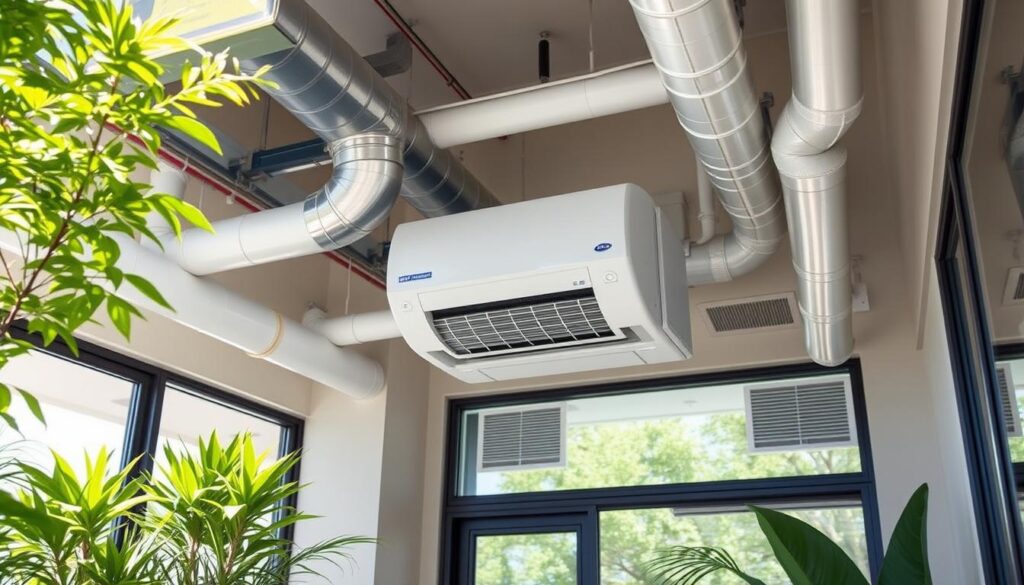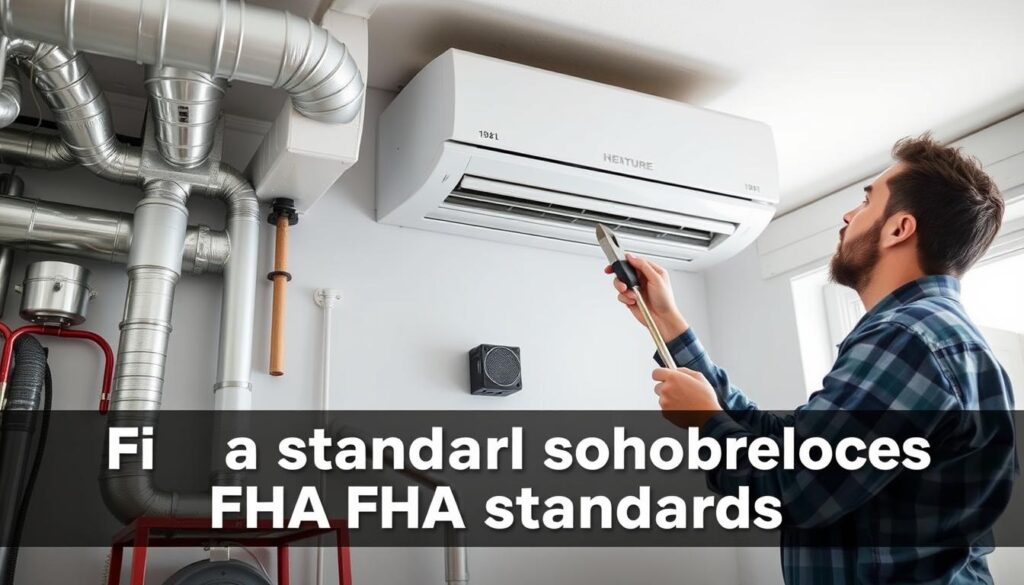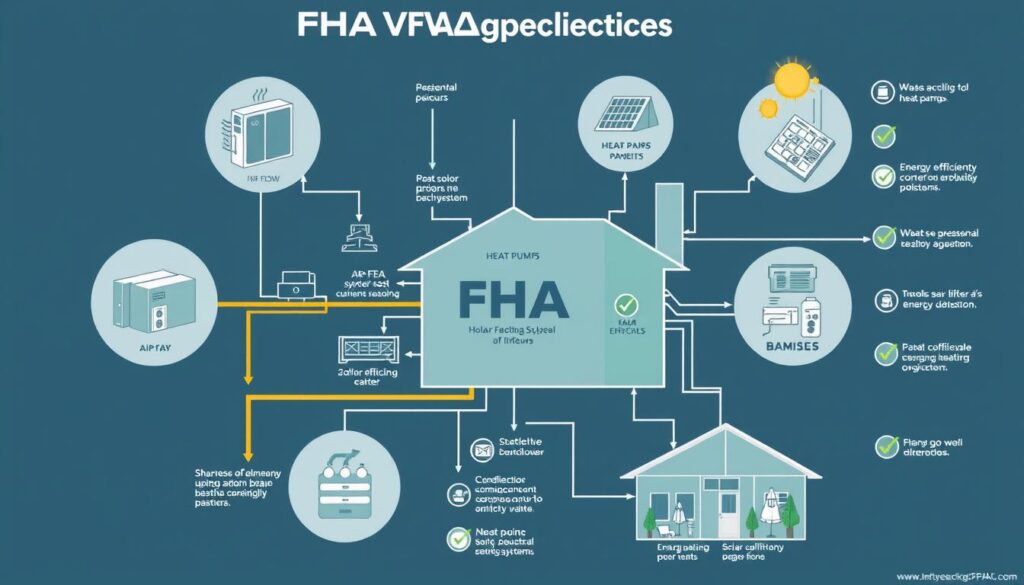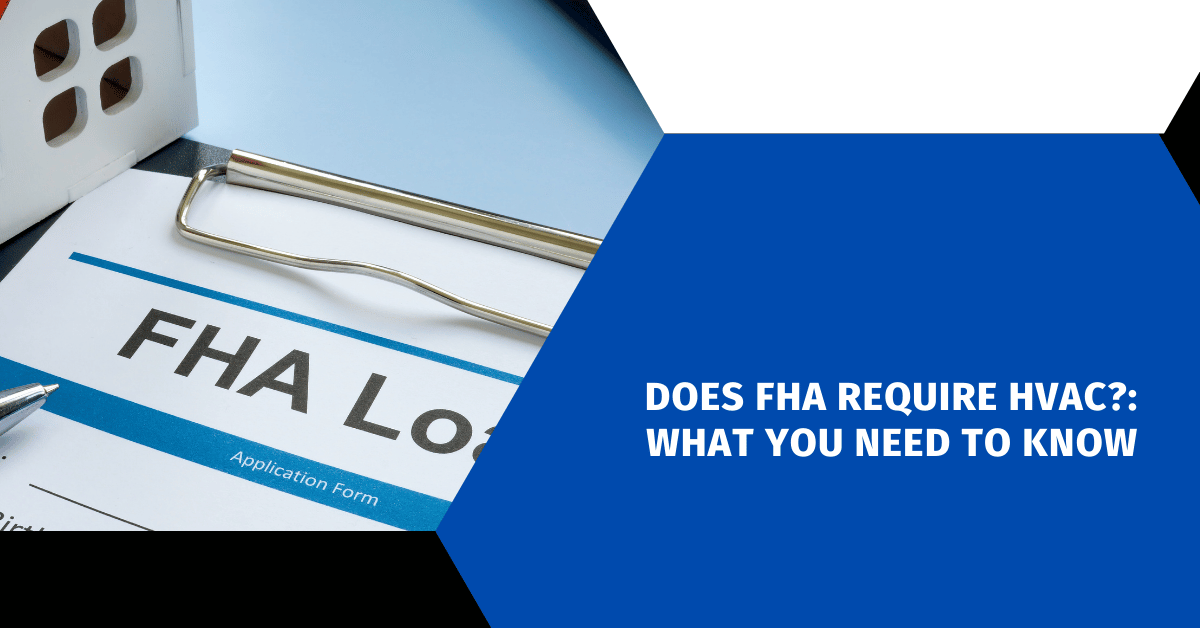Affiliate Disclosure
HVAC Guide Guys is a participant in the Amazon Services LLC Associates Program, an affiliate advertising program designed to provide a means for sites to earn advertising fees by advertising and linking to Amazon.
Does FHA Require HVAC? If you’re thinking about an FHA home loan, you must know the FHA’s HVAC rules. These rules help make sure your new home is safe, comfy, and energy-smart. They cover things like minimum temperatures and how easy it is to get fuel.
“The secret of getting ahead is getting started.” – Mark Twain
In this article, we’ll explore the FHA’s HVAC rules in detail. We’ll help you understand what you need to know for a successful homebuying journey. Whether you’re buying your first home or investing in real estate, knowing these rules will help you make smart choices and feel confident in the FHA loan process.

Key Takeaways
- FHA-approved houses must have an HVAC system that heats living areas to a minimum of 50 degrees Fahrenheit automatically.
- HVAC systems must provide healthful and comfortable heat, operating without human intervention for extended periods.
- Central air conditioning is not a requirement, but if installed, it must be operational.
- FHA appraisal rules may differ from state/local building codes, with the latter taking precedence.
- FHA loan limits vary by county and are influenced by the area’s median home prices.
Table of Contents
Understanding FHA HVAC System Guidelines
Getting an FHA loan means the home’s HVAC system is key. FHA rules ensure homes are safe, efficient, and comfy for new owners.
Basic FHA Requirements for Heating Systems
FHA says the home’s heating must keep areas at 50 degrees Fahrenheit. It must also be safe, comfy, and use easy-to-get fuel. The system should work well on its own for a long time.
The Role of HVAC in FHA Appraisals
FHA appraisers check the HVAC system’s condition. If it’s not up to par, they tell the lender. The lender might ask for fixes before approving the loan.
Minimum Temperature Requirements
The FHA wants the heating to keep areas at 50 degrees Fahrenheit. This makes sure homes are comfy and healthy, even when it’s cold.
| FHA HVAC Requirement | Details |
|---|---|
| Minimum Temperature | 50 degrees Fahrenheit in all living areas |
| Heating System Operation | Automatic, without human intervention for extended periods |
| Fuel Source | Readily obtainable |
| Market Acceptance | The system must have widespread acceptance in the local market |
| Central Air Conditioning | Not required, but must be in working condition if installed |
Knowing FHA HVAC rules helps buyers and owners. It ensures their home is ready for FHA loans. Plus, it makes sure the home is comfy, safe, and energy-smart.
Explore Our HVAC Shop
Looking for top-rated HVAC tools, parts, and accessories? Visit our shop and find the perfect solution for your needs.
Visit the ShopDoes FHA Require HVAC?
Many people wonder about FHA loan requirements and HVAC systems. The FHA doesn’t require homes to have central air conditioning. But, if a home already has a central HVAC system, it must work well for FHA approval.
The FHA appraisal is key in checking a home’s HVAC system. An FHA-approved appraiser will look at how well the HVAC works. They’ll also check for any needed repairs and how much they might cost.
Even though air conditioning isn’t needed, the FHA has strict rules for heating systems. Homes getting FHA loans must have a heating system that’s safe, efficient, and comfortable. The appraiser will check the heating system to make sure it meets FHA standards.
To sum up, the FHA doesn’t require a central HVAC system. But, if a home has one, it must work right and meet FHA safety and efficiency rules. Making sure the heating system is up to par is important for FHA loan approval.
Essential Heating System Standards for FHA Approval
Getting an FHA loan depends a lot on the home’s heating system. FHA has rules to make sure homes are safe and warm for everyone. Let’s look at what’s needed for FHA approval.
Automatic Heating Requirements
The FHA says heating systems must keep all living areas warm. They need to be at least 50 degrees Fahrenheit. This makes sure homes stay warm without needing someone to turn it on.
Fuel Source Accessibility
Homeowners need easy access to the fuel for their heating. This could be natural gas, propane, or electricity. The FHA checks if this fuel is available nearby. This helps avoid heating problems in winter.
Safety and Comfort Standards
FHA rules focus on safe and cozy heating. The system should work well and keep people warm without being watched all the time. It’s important for safety and comfort.
These FHA rules cover all living and non-living areas that could freeze. Following these guidelines means homes are safe and comfortable for everyone.
Central Air Conditioning Requirements and FHA Loans
FHA home loans have specific rules for central air conditioning. It’s not a must-have for approval, but if a home has it, it must work. This ensures the system is in good shape.
FHA guidelines say an appraiser must check the air conditioning. They look at its condition, how it affects the home’s appeal, and the repair costs. This helps the home meet FHA standards and protects everyone involved.
The FHA focuses on safety, security, and soundness in homes. This means the HVAC system must work well and be enough for the home. VA loans have similar rules.
Even though central air isn’t a must, FHA will still check it during appraisal. Buyers and sellers need to fix any problems to meet FHA’s HVAC rules and get the loan.

Explore Our HVAC Shop
Looking for top-rated HVAC tools, parts, and accessories? Visit our shop and find the perfect solution for your needs.
Visit the ShopHVAC System Inspection Process
When you’re applying for an FHA loan, the HVAC system in the home you’re looking to purchase will be carefully inspected by the appraiser. This process is crucial to ensure the property meets the FHA’s stringent requirements for heating, ventilation, and air conditioning (HVAC) systems.
What Appraisers Look For
FHA appraisers will closely examine the HVAC system. They check if it provides adequate heating in all living areas. They also look for safety, a reliable fuel source, and if it can function without constant human intervention.
Common HVAC Deficiencies
- Insufficient heating capacity to warm the entire home
- Safety issues, such as gas leaks or improper ventilation
- Inoperable or malfunctioning HVAC equipment
Documentation Requirements
The appraiser will thoroughly document any issues with the HVAC system in their report. They’ll include the impact on the property’s value and marketability. This information is crucial for the lender to determine if the home is eligible for an FHA loan.
| FHA HVAC Inspection Checklist | Requirement |
|---|---|
| Heating Capacity | Sufficient to heat all living areas |
| Safety | No gas leaks or improper ventilation |
| Functionality | Fully operational without constant human intervention |
By understanding the FHA HVAC inspection process, homebuyers can better prepare for the appraisal. They can ensure their property meets the necessary requirements for an FHA loan.
Local Building Codes and FHA HVAC Standards
FHA-insured loans follow FHA HVAC standards and local building codes. FHA has its own rules for heating and cooling systems. But, these rules can’t ignore local laws. So, appraisers and lenders must check both FHA and local rules for HVAC setups.
This way, both the buyer and the lender are protected. It makes sure the property is safe, comfortable, and works well. By following local codes, FHA respects the unique needs of different areas.
- FHA’s minimum property standards cover three key requirements: safety, security, and soundness.
- An FHA appraisal is conducted to ensure a property meets the necessary standards and determine the home’s market value.
- FHA loans have specific conditions for the home’s interior to pass appraisal standards, including functioning home systems and appliances.
| FHA HVAC Regulations | Local Building Code Requirements |
|---|---|
| Minimum 50°F heating in living areas | Varies by location |
| Central air conditioning not required, but must be functional if installed | Varies by location |
| Safety and soundness of HVAC systems | Specific local code adherence |
By following FHA and local building code standards, FHA-insured loans get a thorough check. This approach keeps the FHA loan program strong. It also respects the unique needs of different areas.
HVAC Repair and Replacement Guidelines
When an FHA appraisal finds HVAC problems, repairs or new systems might be needed for loan approval. The fix depends on how bad the issues are. Small problems can be fixed fast, but big ones might mean a new system is needed. It’s key to make sure the property meets FHA standards before buying.
Required Repairs for FHA Approval
FHA rules say the HVAC system must work well and meet safety and efficiency standards. Common fixes include:
- Replacing broken or not working HVAC units
- Fixing heating, ventilation, and air conditioning parts
- Checking if HVAC equipment is installed and vented right
- Dealing with safety issues like gas leaks or carbon monoxide
Timeline for Corrections
The time needed for HVAC fixes or new systems under an FHA loan should let work finish before closing. This can take from a few days for small fixes to weeks for big projects. The appraiser will tell you what needs to be done and when, helping buyers and sellers plan.
| Common HVAC Deficiencies | Repair Timeline |
|---|---|
| Inoperable HVAC system | 2-4 weeks |
| Inadequate heating or cooling capacity | 1-2 weeks |
| Safety issues (e.g., gas leaks, carbon monoxide) | 1-2 days |
| Improper HVAC installation or venting | 1-2 weeks |
Knowing FHA HVAC rules and repair times helps buyers and sellers have a smooth FHA loan home buying process.
Explore Our HVAC Shop
Looking for top-rated HVAC tools, parts, and accessories? Visit our shop and find the perfect solution for your needs.
Visit the ShopAlternative Heating Sources and FHA Compliance
FHA-approved HVAC systems allow for different heating options. Homes using solar or wood-burning heaters need a backup. This backup must keep the home at least 50 degrees Fahrenheit.
Space heaters are not good enough as the main heat source. The backup system must be permanent, safe, and warm the whole house. This makes sure the home is cozy and safe for everyone living there.
- FHA guidelines allow for alternative heating sources, such as solar-powered or wood-burning devices, as long as they have a backup system that can maintain at least 50 degrees Fahrenheit.
- Space heaters are generally not considered a suitable primary heat source for FHA compliance.
- The alternative heating system must be permanent, safe, and able to heat the entire living space effectively.
Following these FHA HVAC rules helps make sure the home’s heating is safe and comfy. It creates a warm and secure place for the homeowner.

“The FHA’s primary concern is ensuring that a home is safe, comfortable, and energy-efficient for the occupants. That’s why they have these specific guidelines for alternative heating sources.”
Explore Our HVAC Shop
Looking for top-rated HVAC tools, parts, and accessories? Visit our shop and find the perfect solution for your needs.
Visit the ShopHVAC Certification Requirements for FHA Loans
Getting an FHA loan means the home’s HVAC system is key. The FHA doesn’t need HVAC certification, but the appraiser’s check is like a certification. If the HVAC has problems, a certified tech might need to inspect it.
This inspection gives a detailed report on the HVAC’s state, how long it will last, and if repairs or a new system are needed. This ensures the HVAC meets FHA standards. It also protects the buyer and the lender.
Key HVAC Requirements for FHA Loan Approval
- Automatic heating system capable of maintaining a minimum of 50 degrees Fahrenheit in living areas
- Proper ventilation and air circulation to ensure adequate indoor air quality
- No visible signs of damage, leaks, or safety hazards in the HVAC system
- Appropriate fuel source accessibility and reliable operation of the heating system
- Compliance with local building codes and FHA’s minimum property standards
Fixing any HVAC issues found during the appraisal helps homebuyers get FHA loan approval. This step brings them closer to owning their dream home.
| FHA HVAC Requirement | Description |
|---|---|
| Minimum Temperature | FHA appraisers require the HVAC system to automatically heat living areas to a minimum of 50 degrees Fahrenheit. |
| Fuel Source Accessibility | The heating system must have easy access to its fuel source, such as natural gas, propane, or electricity. |
| Safety and Comfort | The HVAC system must provide adequate ventilation and air circulation to ensure the home’s livability and indoor air quality. |
Knowing and following FHA’s HVAC rules helps homebuyers get FHA loan approval. This confidence is key to securing their dream home.
Conclusion
The FHA HVAC requirements are in place to make sure homes financed through FHA loans are safe and comfortable. They don’t require central air conditioning, but the system must meet certain standards. This is especially true for heating in colder areas.
Knowing these rules is key for buyers, sellers, and lenders in FHA deals. They must follow both FHA and local laws to get the loan approved. This protects everyone’s interests.
The FHA HVAC rules are meant to protect the homeowner’s investment and the lender’s property. They also help make housing more affordable. The inspection process checks if the home meets safety and comfort standards.
For first-time buyers or seasoned real estate pros, understanding FHA HVAC rules is important. It helps you make smart choices and follow FHA’s goals. Staying informed ensures a smooth FHA loan process.

